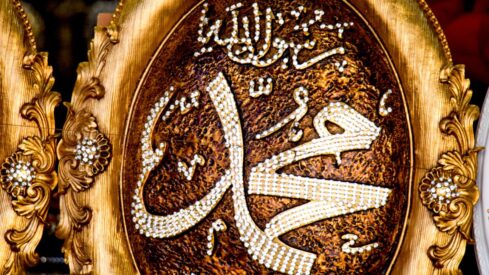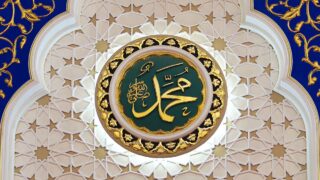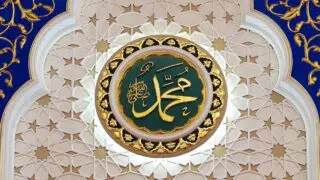The Prophet’s own married life shows a remarkable change after his emigration to Madinah.
When he was in Makkah, the Prophet had one wife, Khadijah, with whom he lived for 25 years until her death three years before his emigration.
There is no report whatsoever of the Prophet entertaining any thoughts of another marriage while Khadijah was alive, despite the fact that polygamy was a common practice and a recognized institution in the social life of Arabia. There was no limit to the number of wives a man could have.
In Madinah, the Prophet married several wives in a period of ten years. A careful consideration of the Prophet’s marriages is certain to reveal important reasons for each marriage which cannot be overlooked.
These reasons relate mostly to the establishment of strong ties between the Prophet and important figures among the Muslims, with unmistakable effects on the future of the Islamic state the Prophet established in Madinah. Some of these marriages were highly beneficial to the tribes to which the wives concerned belonged.
Social Reform Enforced
Of the Prophet’s marriages that took place at this time was to Zaynab bint Jahsh, one meant to enact and implement decisive laws in Islam.
The enemies of Islam have always sought to use this marriage as a vehicle for their false propaganda against Islam and the Prophet. There will always be some people who try hard to twist plain facts in order to achieve their personal ends.
In point of fact, the Prophet had married each single one of his wives for some particular reason due to particular circumstances.
This marriage of the Prophet is an example of the type of incident which should raise no curiosity and stir no controversy if taken in its proper perspective. It is also the type of event which can be given a totally different color through the distortion of some details leading to, or resulting from it.
When Muhammad was only a young man of 25, some 15 years before he received his message, he married Khadijah bint Khuwaylid, who gave him a slave boy named Zayd ibn Harithah to serve him. Even at that early stage in his life, Muhammad felt that slavery was extremely repugnant. He did not wish to own a slave.
He therefore set Zayd free and allowed him to stay in his service as a free man. When Zayd realized what sort of man Muhammad was, and what a fine character he had, he became so fond of him that he did not wish to change his situation in relation to him.
Zayd had originally belonged to an Arabian tribe and was taken prisoner when another tribe raided the quarters of his own people. He was then sold in Makkah and came into Khadijah’s possession.
Zayd’s father and uncle tried to buy his freedom, but Muhammad told them that Zayd was free to go with them if he wished. “If he, on the other hand, chooses to stay with me, I would not part with him for anything you offer.”
Thus, Zayd unhesitatingly chose to stay with Muhammad, saying to his incredulous father and uncle that he had known Muhammad for several years and he would not part company with him for anything in the world. As a result, Muhammad declared in front of everybody in Makkah his decision to adopt Zayd as his own son.
All these events took place long before Islam. As the Prophet received his first revelations, Zayd was the first man to embrace Islam. He knew Muhammad too well to entertain any doubt about the truthfulness of his message. He served Islam as one of its best followers and a soldier with the Prophet assigning to him the command of several expeditions. Perhaps the Prophet did not love any man better than he loved Zayd, with the possible exception of Zayd’s own son Usamah.
When the Prophet had settled in Madinah, he wanted to marry Zayd to one of his own relatives, Zaynab bint Jahsh, whose mother was Umaymah bint Abd al-Muttalib, the Prophet’s own parental aunt. She was not keen on the marriage. Her brother was even less agreeable. After all, Zaynab belonged to the same family as the Prophet, which was the noblest family in the whole of Arabia.
In comparison to such a great lineage, who was Zayd? Was he not a mere slave to whom the Prophet had shown great kindness? He was being called Zayd ibn Muhammad, it is true; but that appellation did not change the facts. Zaynab, however, did not have much choice. She was a good Muslim and as such she could not refuse a wish expressed by the Prophet.
The Prophet’s purpose behind marrying his own cousin to a former slave was to destroy for ever all class distinction. Zaynab and her brother consented to the marriage, with reluctance, to obey the Prophet. They realized that it was not up to them to dissent, especially when God revealed in the Quran that an order by the Prophet was final, even when it involved the personal life of any believer.
{It is not fitting for a Believer, man or woman, when a matter has been decided by Allah and His Messenger to have any option about their decision: if any one disobeys Allah and His Messenger, he is indeed on a clearly wrong Path.} (33: 36)
Zayd’s marriage with Zaynab was not a happy one. She had no love for him and could not overlook her class feelings. She always made him conscious that she thought herself far above him socially.
Zayd, who never accepted that he was a slave and never had a slave’s mentality, could not tolerate Zaynab’s attitude. He complained to the Prophet on several occasions. The Prophet was always ready to help. He counseled Zaynab to restrain her pride and to accept God’s decision with regard to her marriage.
As the situation in Zayd’s home continued to flare up every now and then, the Prophet was then instructed by God to let Zayd divorce his wife, since he expressed his desire to do so frequently, although he did not do so in deference to the Prophet’s wishes. The Prophet was further instructed to marry Zaynab when her divorce process was completed.
Greatly perturbed when he received God’s instructions, the Prophet was apprehensive about what such a marriage might bring opting to keep the matter to himself speaking of it to nobody. He realized that if he married Zaynab, people would start talking and accuse him of marrying his daughter-in-law.
Instructional
God’s purpose, however, was to put an end to such false pretensions. No one may claim to be the father of anyone other than his own children.
The system of adoption, with all that it entails, was to be stopped forever. The Prophet, however, did not proceed promptly to implement God’s instructions on this particular occasion. Perhaps he hoped that God might relieve him of this unwelcome duty which caused him so much worry.
He went even further.
When Zayd came again complaining of his wife and expressing a renewed desire to divorce her, the Prophet said to him: “Hold on to your wife and have fear of God.”
At this point, Quranic revelations were received by the Prophet which criticized his attitude and encouraged him to allow Zayd to divorce Zaynab. He was again commanded to marry Zaynab when she was fully divorced. That certain people might say that Muhammad was marrying his daughter-in-law should not be a reason to stop the Prophet from fulfilling God’s instructions. Adoption is, after all, a form of forgery.
As there was a need to put this new system into effect, Allah ordered the Prophet to do so leaving no room for doubt or ambiguity.
The source of information on these events is nothing less authoritative than the Quran itself. God addresses the Prophet in the Quran, making clear that He was fully aware of the Prophet’s feelings:
{And when you said to him to whom Allah had shown favor and to whom you had shown a favor: Keep your wife to yourself and be careful of (your duty to) Allah; and you concealed in your soul what Allah would bring to light, and you feared men, and Allah had a greater right that you should fear Him. But when Zaid had accomplished his want of her, We gave her to you as a wife, so that there should be no difficulty for the believers in respect of the wives of their adopted sons, when they have accomplished their want of them; and Allah’s command shall be performed.} (33: 37)
The marriage of the Prophet and Zaynab was thus made in fulfillment of God’s own instructions: {We gave her to you as a wife}.
Since the system of adoption was well entrenched in Arabian society, only a practical example by the Prophet himself would be sufficient to put an end to it and all that it entails:
{Allah has not assigned to any man two hearts within his body, nor has He made your wives whom you declare (to be your mothers) your mothers, nor has He made those whom you claim (to be your sons) your sons. This is but a saying of your mouths. But Allah says the truth and He shows the way.} (33: 4)
{Call them after their fathers. That will be more equitable in the sight of Allah. And if you know not their fathers, then (they are) your brothers in the faith, and your clients. And there is no sin for you in the mistakes that ye make unintentionally, but what your hearts purpose (that will be a sin for you). Allah is ever Forgiving, Merciful.} (33: 4-5)
This article is excerpted from Adil Salahi’s Muhammad: Man and Prophet, published by the Islamic Foundation. It is republished here with kind permission and with slight editorial changes.
By Adil Salahi


















